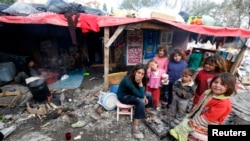GENEVA —
The United Nations warned Friday that many Syrian children are suffering from psychological stress, are not in school, and are living separately from parents as a result of the nearly three year-long crisis.
According to U.N. data, more than 1 million Syrian children are registered with the world deliberative body's refugee agency, UNHCR, the majority of who are in neighboring Lebanon and Jordan.
Despite fleeing violence that has engulfed the country as government and opposition forces battle, these children continue to suffer the impacts of war.
In a new report, “The Future of Syria: Refugee Children in Crisis,” UNHCR says of the 1.1 million children it has registered, 75 percent are under the age of 12. The agency is urging international donors to step up financial support to refugee families, which in turn could help displaced children.
“It illustrates the immense suffering — we are talking here of psychological distress, withdrawal, anger, loneliness, fractured families and widespread use of child refugees as labor. And also tragically moving forward, more than half of Syria’s child refugees are missing out on schooling," said UNHCR spokesman Brian Hansford
Despite efforts to keep Syrian refugee children in school, as of September, more than 100,000 were not enrolled in Jordan and twice that number could be out of school in Lebanon by the end of this year, the U.N. reports.
Disabled children are having an even harder time with already limited educational opportunities.
Many children, especially boys, are out of school because their families need them for work, and Hansford says the report found that one-in-10 Syrian refugee children in the region are working, many for long hours and in dangerous conditions, including in construction and agriculture.
“One child interviewed, he was burned by hot oil in a restaurant, another cut his hand while fixing a car mirror, and a third was beaten by the son of his boss," Hansford said. "Basically these are children deprived of their childhood.”
The report also indicates that refugee babies are also at risk and lack proper documentation. Babies born in Syria to families that fled the country — or those born as refugees in Jordan or Lebanon — are typically without birth certificates, which, according to Hansford, can create problems in the future.
“A birth certificate is a vital document to protect against risks such as statelessness," he said. "Without a birth certificate, people can have difficulties later enrolling in schools, or getting health care and other services, and basically their human rights are in peril.”
The report also found that many Syrian children are growing up without one or both of their parents.
More than 70,000 Syrian refugee families live without fathers and nearly 4,000 refugee children are unaccompanied by or separated from both parents. The U.N. has centers for these children in refugee camps where they try to provide social services while they try to reunite the youngsters with relatives.
According to U.N. data, more than 1 million Syrian children are registered with the world deliberative body's refugee agency, UNHCR, the majority of who are in neighboring Lebanon and Jordan.
Despite fleeing violence that has engulfed the country as government and opposition forces battle, these children continue to suffer the impacts of war.
In a new report, “The Future of Syria: Refugee Children in Crisis,” UNHCR says of the 1.1 million children it has registered, 75 percent are under the age of 12. The agency is urging international donors to step up financial support to refugee families, which in turn could help displaced children.
“It illustrates the immense suffering — we are talking here of psychological distress, withdrawal, anger, loneliness, fractured families and widespread use of child refugees as labor. And also tragically moving forward, more than half of Syria’s child refugees are missing out on schooling," said UNHCR spokesman Brian Hansford
Despite efforts to keep Syrian refugee children in school, as of September, more than 100,000 were not enrolled in Jordan and twice that number could be out of school in Lebanon by the end of this year, the U.N. reports.
Disabled children are having an even harder time with already limited educational opportunities.
Many children, especially boys, are out of school because their families need them for work, and Hansford says the report found that one-in-10 Syrian refugee children in the region are working, many for long hours and in dangerous conditions, including in construction and agriculture.
“One child interviewed, he was burned by hot oil in a restaurant, another cut his hand while fixing a car mirror, and a third was beaten by the son of his boss," Hansford said. "Basically these are children deprived of their childhood.”
The report also indicates that refugee babies are also at risk and lack proper documentation. Babies born in Syria to families that fled the country — or those born as refugees in Jordan or Lebanon — are typically without birth certificates, which, according to Hansford, can create problems in the future.
“A birth certificate is a vital document to protect against risks such as statelessness," he said. "Without a birth certificate, people can have difficulties later enrolling in schools, or getting health care and other services, and basically their human rights are in peril.”
The report also found that many Syrian children are growing up without one or both of their parents.
More than 70,000 Syrian refugee families live without fathers and nearly 4,000 refugee children are unaccompanied by or separated from both parents. The U.N. has centers for these children in refugee camps where they try to provide social services while they try to reunite the youngsters with relatives.











